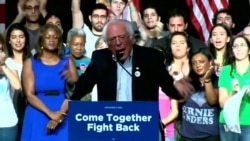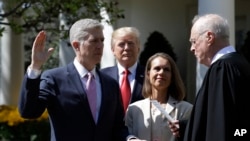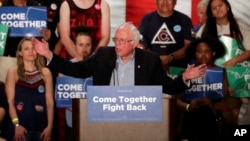President Donald Trump will mark his first 100 days in office on Saturday at the end of what could be a pivotal week in his presidency.
Trump is at a low ebb in terms of popularity for a new president and amid intense debate as to whether he has delivered on many of his campaign promises. But the 100-day mark is also a point of reflection for Democrats as they deal with a riled-up political base demanding they oppose Trump at every turn.
The 100-day measure of success and failure has been applied to presidents since Franklin Roosevelt took office at the height of the Great Depression in 1933 and rushed to implement a number of government measures to counter the economic crisis.
Low approval rating
Several recent polls provided some sobering news for Trump as he prepares to mark the 100 days. A survey by ABC News and the Washington Post found Trump’s approval rating at 42 percent with 53 percent disapproving. That is the lowest rating for any president at this point in their first term since pollsters began asking about public approval in 1945. By way of contrast, former President Barack Obama registered 69 percent approval eight years ago during his first few months in office.
The latest NBC News-Wall Street Journal poll has Trump at 40 percent approval, 54 percent disapproval. And the most recent Gallup Tracking Poll also had Trump at the same numbers.
Trump can take some consolation from the ABC/Washington Post poll that found 96 percent of those who voted for Trump say it was the right thing to do, while only two percent said they now wished they had not.
The 100 days dilemma
On one hand, Trump wants to highlight his achievements during his first 100 days, including his various executive orders and the successful battle to install Judge Neil Gorsuch on the Supreme Court. But Trump also told the Associated Press the 100 days measure is “an artificial barrier. It's not very meaningful.” Trump added that those assessing his early days need to take into account that his is “a different kind of a presidency.”
The first 100 days have also been galvanizing for opposition Democrats. Democratic activists have been out in force at recent congressional town hall forums, pressing Republicans about their support for Trump. Democrats loudly went after Arizona Senator Jeff Flake at a recent gathering. “There are some things I agree with President Trump on, and there are some things that I disagree with the president on,” Flake said to those in attendance as some in the crowd shouted, “Shame on you!”
Democrats also took part in recent protests over the president’s refusal to release his tax returns and they are focused on a special congressional election in Georgia in June that some see as a test of Trump’s popularity. The race will pit Democrat Jon Ossoff against Republican Karen Handel to see who will win the seat vacated by Trump’s Health and Human Services secretary, Tom Price. Among those who see this as a significant test for both parties is former George W. Bush political adviser Karl Rove. “A (Republican) defeat could foreshadow major Republican losses in 2018,” Rove wrote in the Wall Street Journal.
Sanders on tour
Among those Democrats trying to build on their newfound party enthusiasm is former presidential candidate and Vermont Senator Bernie Sanders, who has been on a nationwide tour with Democratic National Committee Chairman Tom Perez that is part unity tour and part pep rally. Sanders told a crowd in Florida that whipping the party into shape means “rebuilding the Democratic Party and making it a grass roots party, a party from the bottom on up!”
This bubbling energy on the Democratic side could be problematic for Trump who will likely need their help to avoid a budget crisis and possible government shutdown this week, not to mention support for items like tax reform and infrastructure spending.
On one hand, the president has said, “I think we want to keep the government open. Don’t you agree?” But he has also raised the prospect of demanding that any new funding bill include money for a border wall with Mexico, a non-starter for Democrats like House leader Nancy Pelosi. “The Democrats do not support the wall,” Pelosi said on NBC’s Meet the Press.
Democrats digging in
The new Democratic intensity evident at town halls across the country could complicate Trump’s hopes for bipartisan cooperation. “I think Democrats have taken the lesson that cooperating, unless you really, really want that policy, does not pay electoral dividends for the party,” said Brookings scholar Sarah Binder. “So there is not a lot of political pressure on Democrats to cooperate and I really don't expect to see much cooperation going forward.”
Trump also faces a continuing divide among Republicans on health care and other issues, and some analysts believe Trump has aggravated some of those divisions as president, while at the same time helping Democrats come together. “You want your strategy as president to unite your friends and to divide your foes,” said Brookings analyst William Galston. “Up till now the president has done exactly the reverse, and he didn’t intend to, but he did.”
Perils of partisanship
But flat out Democratic opposition to Trump also carries some risk, cautioned Professor Jeremy Mayer with George Mason University in Virginia. “Resist all the time in every way is probably not the right strategy for the Democratic Party as a whole right now,” Mayer said via Skype. “There is a hunger in this nation to get something done, to meet the other party in the middle.”
Republican strategist John Feehery said the president also needs to be careful if he goes after Democrats. “This is going to be a challenge for him. If he makes the Democrats the enemy, it is going to be very difficult for him to get anything done.”
Democrats were stung by Hillary Clinton’s defeat last November. But their intense opposition to Trump coupled with the president’s early political stumbles have been unifying factors for a party still in search of its own identity after a dispiriting loss in last year’s presidential election.









